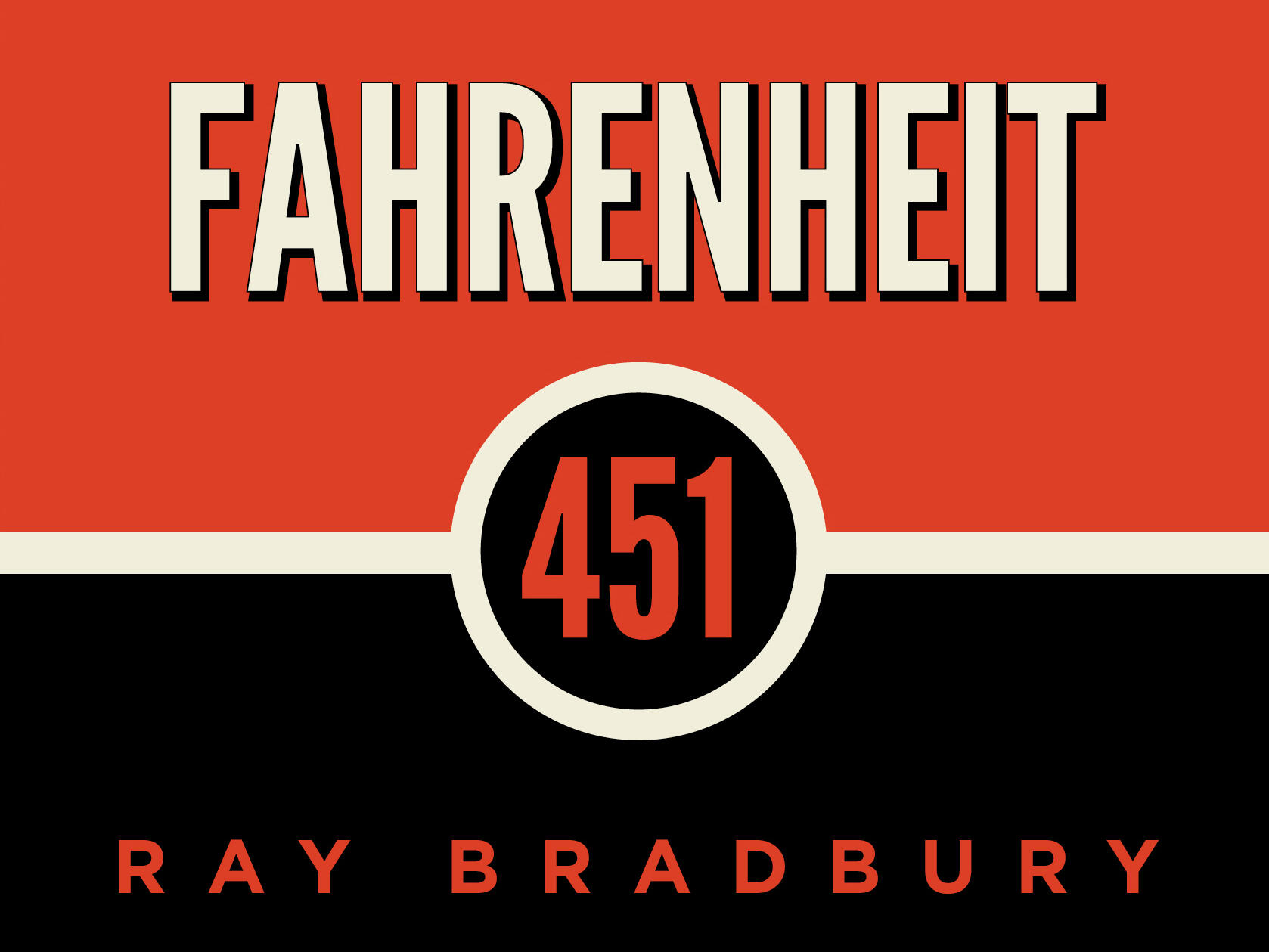Ray Bradbury’s Fahrenheit 451 is one of the most studied works of 20th-century American literature. It explores the idea of a future dystopian society where books are outlawed and systematically destroyed by “firemen.” The destruction of knowledge and ideas keeps the people in society ignorant and easier to control. Bradbury presents ideas about censorship, conformity, and the loss of individuality in a futuristic, technological world.

Historical Context
When Bradbury wrote Fahrenheit 451 in the early 1950s, the world was just recovering from the trauma of World War II. But it was also entering a new period of tension known as the Cold War.
The world had seen how governments could manipulate truth and control information through propaganda and other means, giving rise to the totalitarian regimes in Germany, Italy, and the Soviet Union.
Ray Bradbury was highly influenced by these events, which is why his novel explores these ideas to the extreme.
In the United States, the era of McCarthyism had begun.
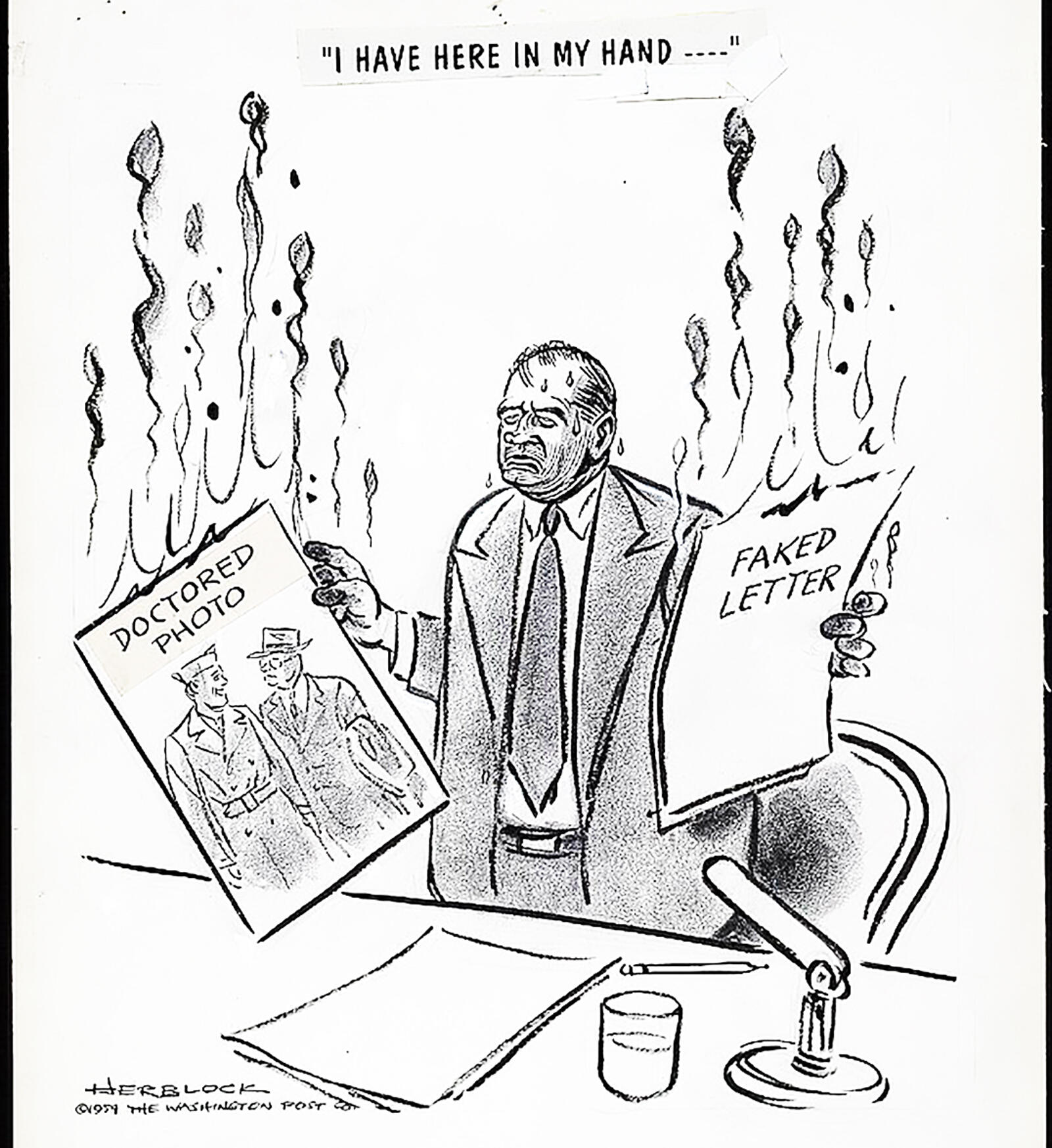
The fear of communism penetrating American government and society was so intense that it led to widespread suspicions and accusations of communism. Many people were blacklisted, mostly artists, writers, and filmmakers.
Media was censored to be extremely pro-American Democracy (for example, the 1954 film of Animal Farm was sponsored by the CIA, and the ending was changed to show the animals rebelling against the pigs to promote overthrowing communism).
McCarthyism was a period of paranoia about communism in the United States in the 1940s-50s. Senator Joseph McCarthy had accused several government employees of being in the communist party, which kicked off an era where many Americans were accusing one another of being communist sympathizers or spies (especially for the Soviet Union). Government employees were regularly screened for “loyalty,” and those on the “far-left” were suspected of treason.
Ray Bradbury saw parallels between these real-world efforts to silence anyone not feverishly pro-American and the fictional society he imagined. He feared that the mass culture (meaning television, advertising, and entertainment) was dulling people’s ability to think critically.
His reasons for sensing the pattern made perfect sense, and comparing the trends Bradbury noticed back then to the way our society functions now is, frankly, unsettling. Television grew rapidly in the 1950s, becoming a standard in homes and businesses across the country, so Bradbury saw a screen-obsessed, distracted, media-saturated public.
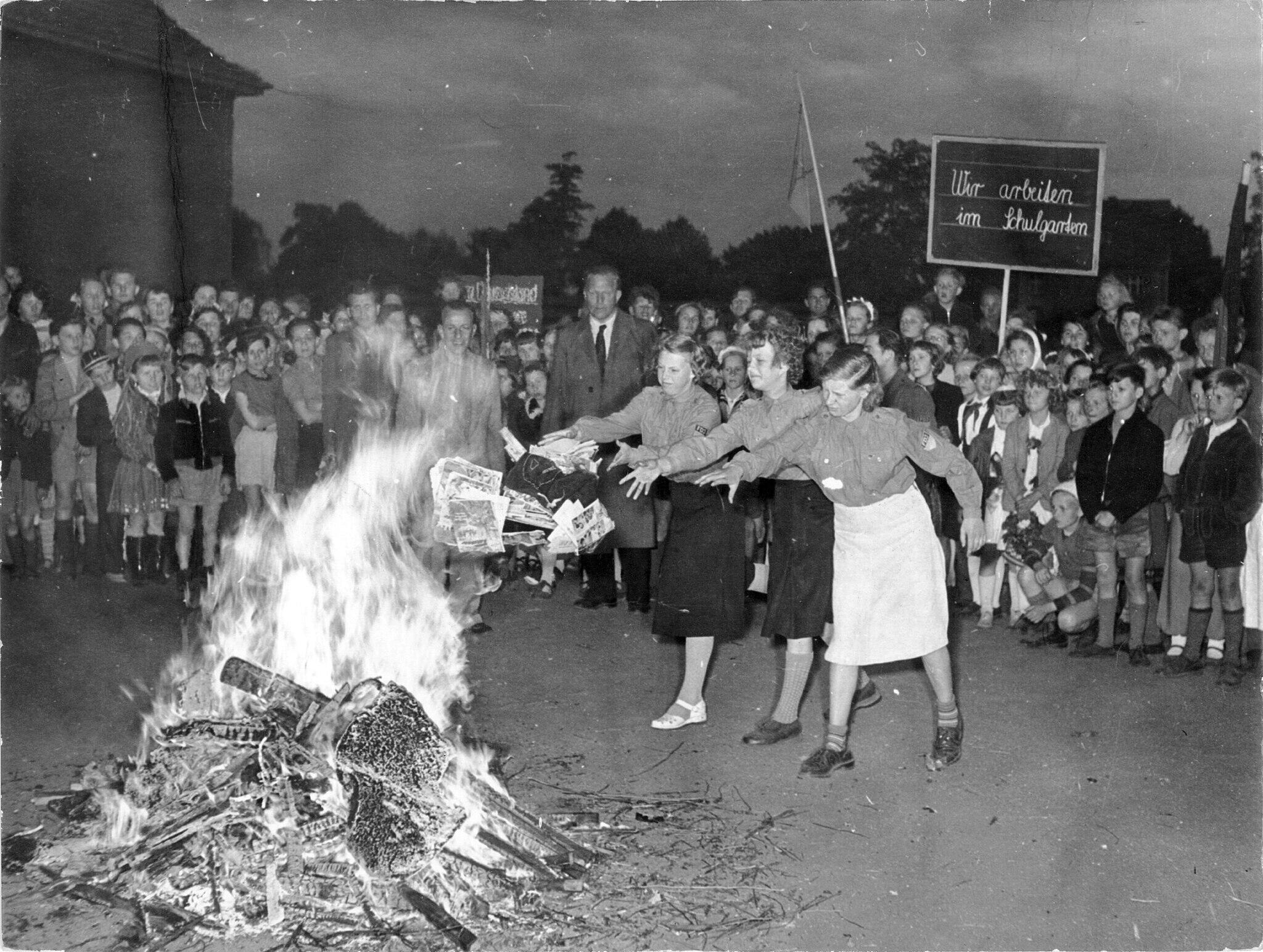
Bradbury predicted in Fahrenheit 451 that daily life would be dominated by screens, replacing face-to-face interactions, conversations, and personal reflection and thinking. His warnings about censorship and conformity were political and cultural. He posed the viewpoint that government oppression could be aided by the public’s willingness to trade thought and individuality for comfort.
Fahrenheit 451 was a response to censorship and a rally to protect intellectual freedom. It sums up mid-century fears about technology, propaganda, the fragility of democracy, and the country’s future. It stands as an important discussion about modern-day society, too.
Overview of Fahrenheit 451
Fahrenheit 451 was written by American author Ray Bradbury and published in 1953. It's his only work of science fiction.
He wrote during a time when the fear of government control, censorship, and mass media influence was growing in the United States. The title refers to the temperature at which paper is said to catch fire: 451 degrees Fahrenheit. (In reality, it’s between 424℉ and 480℉ on average.)
The novel is set in a nameless American city in the future. Society is obsessed with speed, entertainment, and instant gratification. Books and reading are banned in part because they allow people to have different ideas, which leads to thinking and questioning authority. The other part is because books can cause confusion and complicated emotions, which Captain Beatty explains causes discontentment and conflict.
It's been just a few years since all books were banned; the process was very gradual to avoid alarming society.
Colored people don’t like "Little Black Sambo." Burn it. White people don’t feel good about "Uncle Tom’s Cabin." Burn it. Someone’s written a book on tobacco and cancer of the lungs? The cigarette people are weeping? Burn the book.
Captain Beatty
Firemen are now called so because they start fires to destroy books en masse. Television screens are everywhere and fill entire walls, making it impossible to avoid them. People escape from reality through constant noise and distraction.
The story follows Guy Montag, a fireman who begins to doubt the system he serves. He goes from an obedient government worker happy to burn books to a champion of intellect and knowledge.
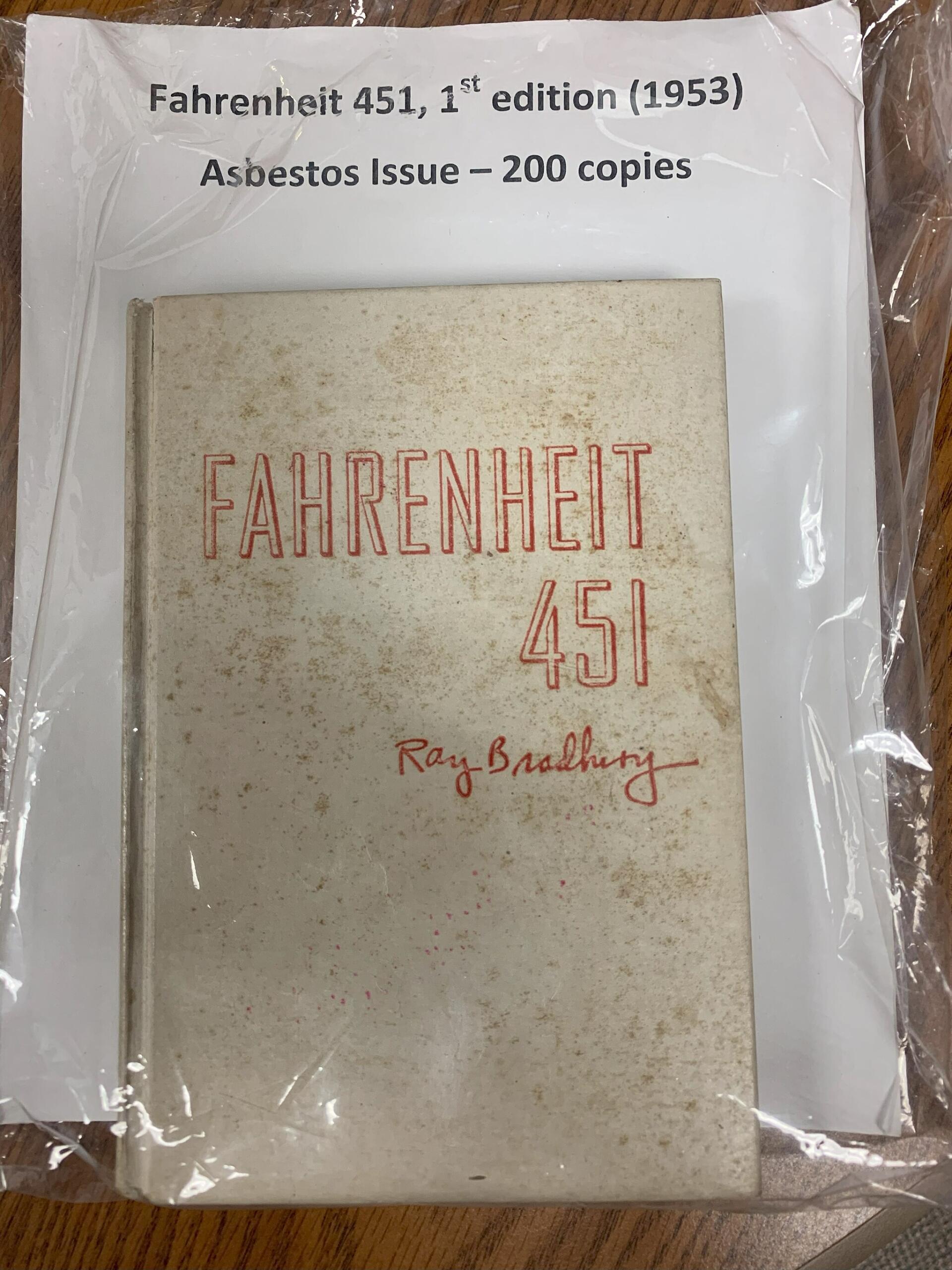
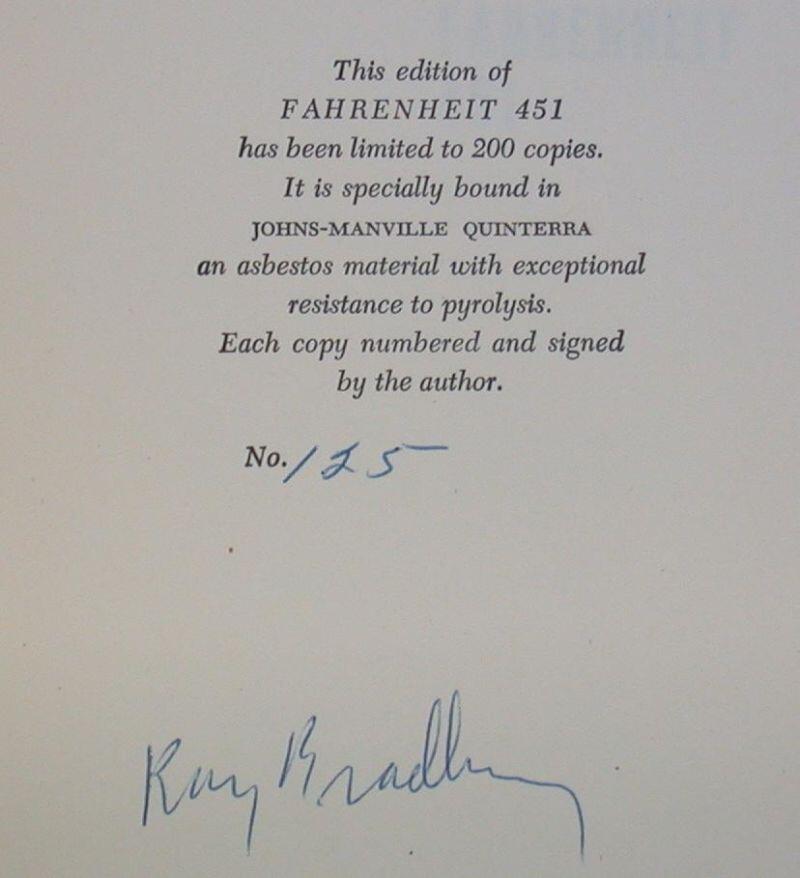
Timeline of Major Events
To keep the storyline clear and easy to follow, here is a timeline of all the most important events in the novel. We don't know the exact dates the story is meant to take place in, but the book references two atomic wars that happened in the 1990s, so we can assume it's at least the new millennium. It's theorized that the setting could be the year 2049. The events seem to take place over about a week.
Beginning
Guy meets Clarisse
Guy's worldview is challenged when she asks him if he's happy.
Conflict
Mildred overdoses on sleeping pills
The technicians explain that this happens all the time, spinning it as a medical marvel that they can easily save people instead of a revelation that society is deeply unhappy.
Rising Action
Montag sees a woman self-immolate; he steals a book
He begins to consider the importance of books and realizes that his life needs to change.
Clarisse dies
Mildred's disinterested reaction shows how emotionally dead society is. It sparks Guy's resolve to make a difference.
Beatty confronts Montag
Beatty suspects Montag has been collecting books. Montag chooses the riskier option in favor of pursuing knowledge.
Mildred learns about the books
Guy tries to connect with his wife through the books, but she doesn't want anything to do with them.
Guy meets Faber
Guy intends to learn more about literacy from Faber so he can read his books. The two form an alliance and create a plan to plant books in the firemen's houses.
Climax
Guy reveals his books to Mildred's friends
Montag becomes so frustrated with his wife and her friends' vapidness that he reads a poem aloud to them. They are angry and scared, causing Mildred to report Guy to the firemen.
Beatty arrives
He forces Montag to burn his own house down. Guy then kills Beatty with the flamethrower and escapes to the wilderness with Faber's help. There, he meets the other exiles.
Falling action
A fake Montag is executed on TV
The government stages an execution to give the appearance that nobody can escape punishment.
Resolution
The city is bombed
An atomic bomb vaporizes the city. The exiles go to the ruins, intending to rebuild society in a new way. Montag begins to remember Bible verses, symbolizing renewal, guidance, and hope.

Detailed Plot Summary
The novel Fahrenheit 451 begins with Guy Montag, a fireman whose job it is to burn books. He loves his job, taking pride in the fact that he is keeping society safe by getting rid of dangerous ideas. One night, he meets a seventeen-year-old girl named Clarisse McClellan. Her free-spirited nature is out of place in society, but she doesn’t mind. She asks Guy if he is happy, which makes him seriously consider the idea for the first time.
Unsettled, Guy doesn’t know how to feel about the encounter or the question.
He then finds his wife, Mildred, unconscious after overdosing on sleeping pills. She is quickly revived by technicians (rather than medics) who use a machine to pump her stomach, and she has no memory of the event. Montag realizes how “asleep” Mildred is at all times, even when awake. It makes him reflect on how disconnected they both are from the world. Mildred spends all day wearing earbuds that block out the world and watching “families” on TV.
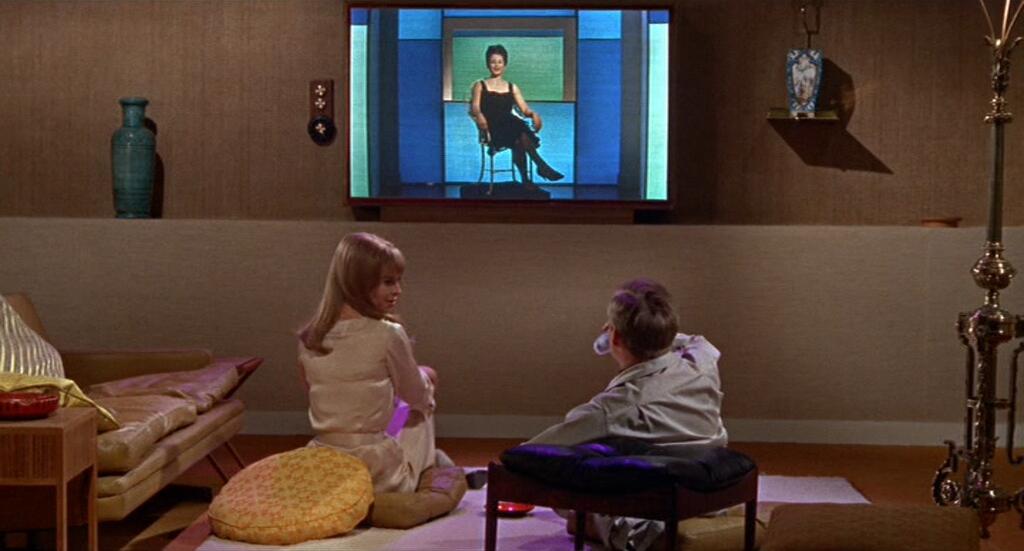
Montag’s curiosity is further sparked by more discussions with Clarisse, but then she abruptly dies, further jolting Guy out of his stupor. He continues working, but starts to question his life and the world around him.
During one raid, Montag and the other firemen are required to burn the library of an old woman who refuses to leave her books. Rather than live without them, she sets herself on fire along with her house. Montag used the opportunity to steal one of her books and hide it in his home. He remains haunted by what he saw.
He ends up confessing to Mildred that he has stashed a few books in their house and intends to read them, to find out why they are forbidden. Mildred is horrified, fearing punishment, so although she attempts to read with Montag, she quickly gives up and goes back to watching television.
The books appear confusing, and Guy has a hard time understanding what they mean. He finds Professor Faber, a retired English professor, to help explain. Faber tells Montag that the value of books is their ability to preserve ideas, even if they are complicated and raise difficult emotions. Faber pushes for Guy to develop his rebellious feelings to get him to fight against society.
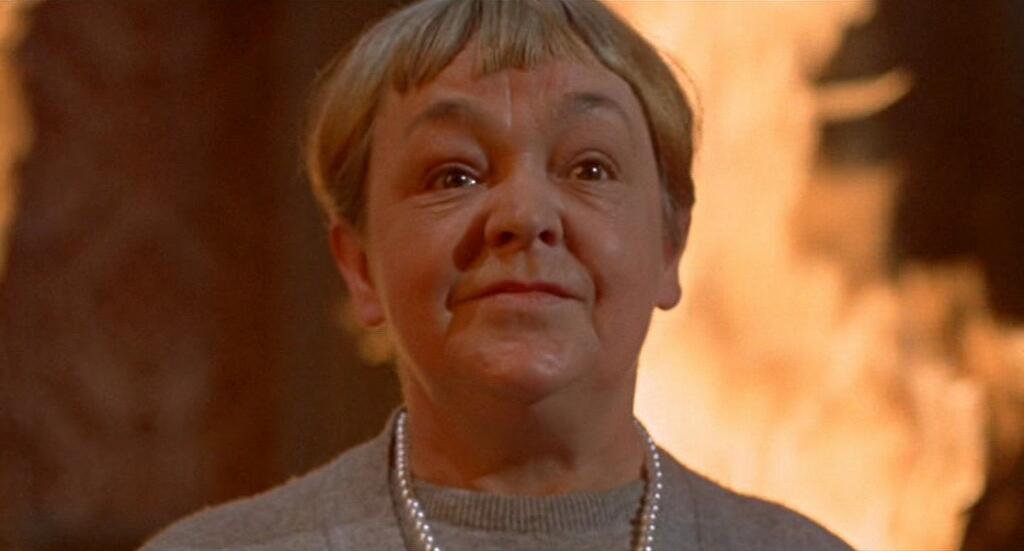
Meanwhile, Montag’s boss, Beatty, tries to influence him to remain complicit and go back to being a proud, unquestioning fireman. He tries to convince Montag that books are useless and not worth risking one’s life over by quoting a passage that contradicts itself. It seems he knows Guy is hiding contraband books in his home, but Montag doesn’t crumble. Sure enough, Montag’s home is soon reported to the firemen.
Beatty orders Montag to set the fire himself. After the incident, Beatty mocks Montag for his failure to overcome the system and threatens to find Faber. Montag then uses his flamethrower to burn Beatty before fleeing the city. He is pursued by a mechanical hound, which is a deadly robot.
Have you seen the hit TV show "Black Mirror"? Notice how many ideas from Fahrenheit 451 match concepts explored in the show. Both the novel and the series explore technology and its implications, especially how it can have very negative consequences and implications. Furthermore, notice how many technological ideas in the novel match real things we have today, like giant TV screens, portable radios (and now screens) with earbuds, and even robot dogs.
Guy manages to escape to the countryside with Faber’s help. There, he meets other runaway intellectuals who have each memorized portions of different books to preserve them for the future. The leader, Granger, explains that they are waiting for society to destroy itself so they can help rebuild it.
Coincidentally, the city is destroyed by an atomic bomb just moments later. The group of exiles is unharmed and sets out to assess the situation and help survivors. Montag remembers passages from the Book of Ecclesiastes in the Bible he memorized, which talk about not pursuing material happiness. Granger talks about the mythical phoenix, which rises from the ashes. The group is hopeful they can rebuild society to be better than it was.
A downfall with a hopeful end is also present in Hamlet.
Main Characters
The characters in Fahrenheit 451 are more relatable than many other characters from other popular school literature. They are not too exaggerated, and they have more freedom than the characters in other dystopian novels, like 1984, for example. Perhaps the most alarming feature is that, even though the novel was written more than 50 years ago, we encounter some of the very same things Ray Bradbury was warning us about today.
Guy Montag
Montag is the protagonist, a fireman who begins as a loyal servant of the regime. He is sparked into questioning authority and his reality by one free-spirited person whose family prioritizes family discussions rather than watching television, like everyone else. Eventually, he begins reading books.
He represents the struggle between conformity and individual thought, especially when you’ve been conditioned for years to value the activities that make you conform.
He personally struggles with having the words needed to express specific feelings and ideas.
This leads to frustration and the sensation of not being in control of himself.
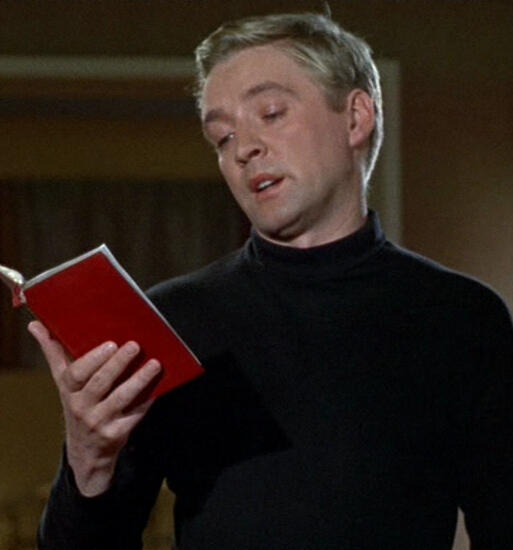
From a psychological perspective, a person who was raised without any of the tools to examine themselves and learn how to perceive their own emotions would probably feel many of the same things Guy does.
Nevertheless, Montag manages to navigate as best he can with his new, unnamed thoughts and feelings, and even escapes from the society that tried to keep him docile. This represents the power of personal awakening that can happen to anyone, should they decide to question the things in their life that might be influencing them.
Scout from To Kill a Mockingbird also challenges social norms.
And I thought about books. And for the first time I realized that a man was behind each one of the books. A man had to think them up. A man had to take a long time to put them down on paper. And I’d never even thought that thought before.
Guy Montag
Clarisse McClellan
Clarisse is a young woman full of curiosity and wonder.
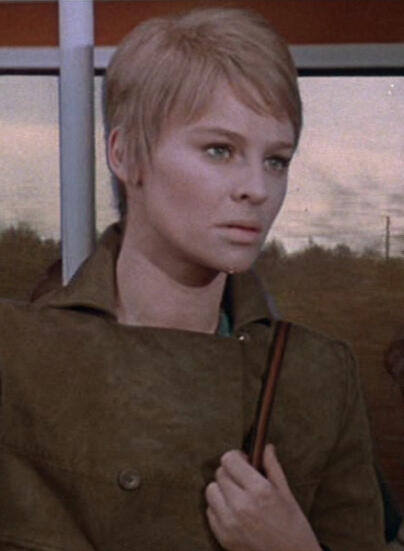
She notices details others ignore, especially things about nature that don’t have anything to do with the omnipresent screens and technology.
Although she was raised in the same society as everyone else, her family’s traditions of spending quality time together helped her avoid many of the same pitfalls as her neighbors, like mindlessness and numbness.
Though her role in the book is brief, she symbolizes free thought and empathy and shows that even the smallest spark can inspire someone to live a more conscious life.
I’m antisocial, they say. I don’t mix. It’s so strange. I’m very social indeed. It all depends on what you mean by social, doesn’t it? Social to me means talking to you about things like this.
Clarisse McClellan
Mildred Montag
Mildred is Montag’s wife and a prime example of what society can do to a person.
In a way, she’s the perfect citizen: docile, numb, unquestioning, filling her role without complaint.
However, she is clearly suffering unconsciously.
She is addicted to television and radio, and she avoids anything even remotely uncomfortable, immediately turning to the screens instead.
Her overdose on sleeping pills shows her deep unhappiness, but she cannot admit it; maybe she can’t even recognize it.
Mildred illustrates how consumer culture and technology can numb people into emotional emptiness.
She is the epitome of “brain rot.”
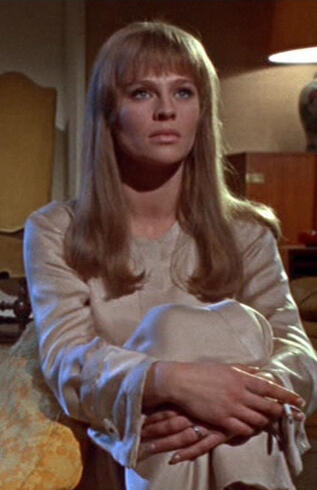
A character who wishes she could be less aware of the world is Daisy from The Great Gatsby.
That's my family.
Mildred, explaining to Guy why she won't turn the TV off.
Captain Beatty
Beatty is Montag’s fire chief and the antagonist. He is well-read but uses his knowledge to justify censorship and control. He argues that books are dangerous because they create conflict. They make people think thoughts that can be uncomfortable, and they lead to people having different opinions about things. He sees these implications of reading as dangerous and bad. The book burnings aim to get rid of these “conflicts.”
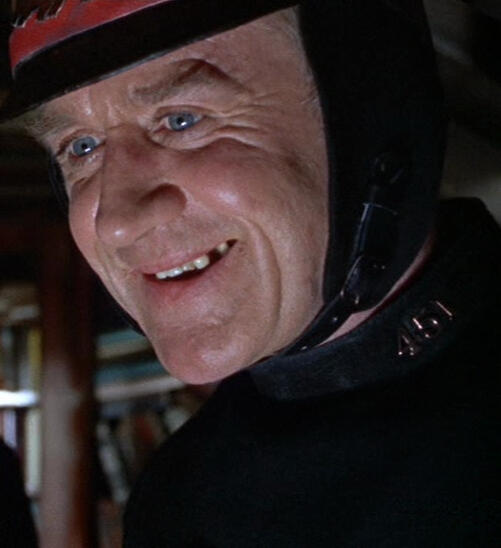
It’s clear that he once cared about reading a lot, presumably before books became illegal.
Perhaps he took a lesson out of Aesop’s Fables and, like the fox who can’t reach the grapes, decided that since he can’t get books anymore, they deserve to be ruined anyway.
He claims he prefers a life of instant gratification over one with complexity and nuance.
He attempts to control Montag into rejoining the unconscious part of society, symbolizing the constant temptation and pressure people who try to reach for more face to just give up.
Beatty’s cynicism reveals the self-deception of those who convince themselves that supporting things like authoritarian systems and the purposeful numbing of society doesn’t go against their human instincts.
Another fear-based society can be found in Lord of the Flies.
We must all be alike. Not everyone born free and equal, as the constitution says, but everyone made equal . . . A book is a loaded gun in the house next door. Burn it. Take the shot from the weapon. Breach man’s mind.
Captain Beatty
Professor Faber
Faber is a former English professor who helps Montag. He is cautious and fearful but believes in the power of literature to spread the truth and make people think. However, he was too cowardly to do any sort of rebellion or sabotage himself. When Montag comes along with a desire to change things, he starts trying to push Montag into living out his own unrealized dreams of revolution.
I’m one of the innocents who could have spoken up and out when no one would listen to the ‘guilty,’ but I did not speak and thus became guilty myself.
Faber
Faber both serves to help liberate Montag’s mind and show that an agenda can also be pushed in the intellectual world. That’s why the ability to think critically and individually is so important; if you rely entirely on what someone else says, you can end up manipulated.
In the end, Faber ends up being a helpful character who is vital in Montag’s escape to freedom.
Through Faber, Bradbury shows that intellectuals share responsibility for society’s decline when they choose silence over resistance. He also demonstrates how powerful, liberating, and motivating it is to go against the things that have tried to hold you and your mind hostage.
Do you know why books such as this are so important? Because they have quality. And what does the word quality mean? To me it means texture. This book has pores.
Faber
Themes and Symbols Throughout the Book
Bradbury formulated Fahrenheit 451 to be full of symbolism. The themes and symbols are timeless messages that we would do well to consider today. Here are the most important themes and symbols found in the novel.
Censorship and Control
Censorship is the main theme of Fahrenheit 451. The government bans books to suppress dissenting ideas and maintain social order. It’s poised that the books contain material that will cause distress and strife, so getting rid of them will prevent conflict and unhappiness. Of course, this is not true, and is underlined when the entire city is bombed at the end of the book.
Citizens are discouraged from thinking or questioning.
Instead, they are constantly bombarded with shallow entertainment. As a result, the majority of the populace is lethargic and unengaged.
They are easy to control because their minds are so overstimulated that they can’t remember anything or take action.
Bradbury shows how censorship can succeed not only through force but also through apathy.
After all, it was the people who put themselves in this position in the first place; the government just took it a step further.

Conformity and Individualism
The novel portrays a society that prizes sameness over individuality. People who think differently, like Clarisse, are labeled “anti-social.” It’s suggested that Clarisse died because she was targeted for being different.
Montag demonstrates the journey from being trapped in a conformist society to breaking free and rediscovering his own mind. Bradbury warns that when everyone thinks alike and is expected to accept things the way they are, creativity and moral judgment disappear.
This idea is explored in a different way in the popular novel 1984.
Technology and Distraction
Technology in Fahrenheit 451 isolates people rather than connecting them. Television walls and “seashell” radios fill every moment with meaningless chatter. Mildred’s obsession with screens reflects how technology can dull a person’s emotions and replace real relationships (and thoughts).
Neither Guy nor Mildred can remember how they met, which highlights how little they practice thinking and accessing memories. Mildred isn’t even bothered about it because her thinking and emotions are so blunted. She doesn’t even remember trying to overdose on sleeping pills, illustrating how derealized she is.
The proposed solution is taking time to form meaningful connections, notice nature, and, of course, read books; all things Montag pursues as he breaks free of the endless cycle of distraction.
Ray Bradbury has said that, in retrospect, he feels this is the bigger message he wants readers to understand.
Knowledge and Ignorance
Books in the novel symbolize knowledge (and therefore freedom), while fire represents destruction and ignorance. Montag learns that thinking, and therefore individuality, requires effort and discomfort. The destruction of the books and the pervasiveness of the meaningless babble on the radios and TVs are clear indicators that society wants everyone to be ignorant.
Montag’s pursuit of knowledge goes hand in hand with his breaking free of distraction and reaching freedom and meaning.
Bradbury argues that knowledge cannot be destroyed completely because ideas live in people’s minds and memories, as evidenced by the rebels who memorize books.
Once, books appealed to a few people, here, there, everywhere. They could afford to be different. The world was roomy. But then the world got full of eyes and elbows and mouths. Double, triple, quadruple the population. Films and radios, magazines, books levelled down to a sort of paste pudding norm, do you follow me?
Beatty
The Dangers of Authoritarianism
Bradbury wrote during a period of political tension and censorship in the United States. The book reflects fears of totalitarianism, where the government manipulates information to control the population. It’s not often talked about, but the “second red scare” in the United States led to a lot of actions from the US government that, ironically, were pretty similar to the very things it claimed to be against. In the name of anti-communism, the government started trying to control the media and use propaganda. Bradbury was warning against censorship in any situation.
This lesson can be further explored in George Orwell’s Animal Farm, which explores how any opportunity for power can be exploited and twisted to control the masses.
Beatty’s speeches echo the authoritarian logic that censorship keeps people happy and equal. Through Montag’s rebellion, Bradbury defends intellectual freedom as essential to democracy.
If you don’t want a house built, hide the nails and wood. If you don’t want a man unhappy politically, don’t give him two sides to a question to worry him; give him one. Better yet, give him none.
Captain Beatty
Fire as a Symbol
Fire in the novel has two meanings. At first, it represents destruction: the burning of books and ideas, even the cause of death for a book-having woman. But by the end, fire becomes a symbol of renewal and rebirth.

The campfire that warms Montag and the other exiles is useful and life-saving.
It represents survival and the origin of civilization, when man had to think and problem-solve to come up with ideas like the wheel, farming, and medicine.
Campfires are also symbolic of human connection and trust.
The bomb that destroys the city is both a symbol of destruction (after all, it probably vaporized the entire population), but it also represents an opportunity to start over, like a phoenix rising from the ashes.
The contrast between the different fires in the novel suggests that knowledge, like fire, can destroy or illuminate, depending on how it is used.
Fahrenheit 451 Quiz
There are a lot of messages to learn when reading Fahrenheit 451! Are you ready to test your knowledge of this popular high school novel? See if you’re prepared to answer any questions you might have on your English literature test! Use these flashcards to check your understanding of Fahrenheit 451.
Summarize with AI:

